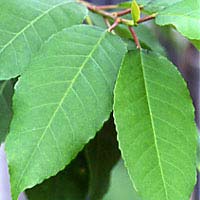Fit and Fast Recipes
Pygeum
 © Martin Wall
© Martin WallParts Used & Where Grown
Pygeum is an evergreen tree found in the higher elevations of central and southern Africa. The bark is used medicinally. Wild pygeum is environmentally threatened and efforts are being made to grow pygeum on plantations and control harvesting in the wild.
- Reliable and relatively consistent scientific data showing a substantial health benefit.
- Contradictory, insufficient, or preliminary studies suggesting a health benefit or minimal health benefit.
- For an herb, supported by traditional use but minimal or no scientific evidence. For a supplement, little scientific support.
Our proprietary “Star-Rating” system was developed to help you easily understand the amount of scientific support behind each supplement in relation to a specific health condition. While there is no way to predict whether a vitamin, mineral, or herb will successfully treat or prevent associated health conditions, our unique ratings tell you how well these supplements are understood by the medical community, and whether studies have found them to be effective for other people.
For over a decade, our team has combed through thousands of research articles published in reputable journals. To help you make educated decisions, and to better understand controversial or confusing supplements, our medical experts have digested the science into these three easy-to-follow ratings. We hope this provides you with a helpful resource to make informed decisions towards your health and well-being.
This supplement has been used in connection with the following health conditions:
| Used for | Amount | Why |
|---|---|---|
Benign Prostatic Hyperplasia | 50 to 100 mg of an herbal extract standardized to contain 13% total sterols twice per day | Safe and effective for men with mild to moderate BPH, pygeum contains compounds that have anti-inflammatory activity and help rid the prostate of any cholesterol deposits. |
Prostatitis | Refer to label instructions | In a preliminary trial, men with chronic prostatitis who were given pygeum extract saw improvement of symptoms and laboratory evaluation of the prostate and urinary tract. |
Traditional Use (May Not Be Supported by Scientific Studies)
The powdered bark was used as a tea for relief of urinary disorders in African herbal medicine. European scientists were so impressed with reports of pygeum’s actions, they began laboratory investigations into the active constituents in the bark. This led to the development of the modern lipophilic (fat-soluble) extract used today.
Copyright © 2026 TraceGains, Inc. All rights reserved.
Learn more about TraceGains, the company.
The information presented by TraceGains is for informational purposes only. It is based on scientific studies (human, animal, or in vitro), clinical experience, or traditional usage as cited in each article. The results reported may not necessarily occur in all individuals. Self-treatment is not recommended for life-threatening conditions that require medical treatment under a doctor's care. For many of the conditions discussed, treatment with prescription or over the counter medication is also available. Consult your doctor, practitioner, and/or pharmacist for any health problem and before using any supplements or before making any changes in prescribed medications. Information expires December 2026.








